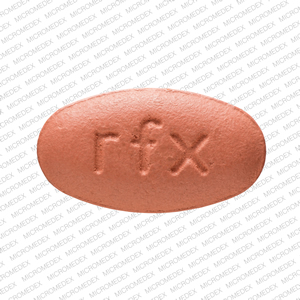Rifaximin Disease Interactions
There are 3 disease interactions with rifaximin.
Antibiotics (applies to rifaximin) colitis
Major Potential Hazard, Moderate plausibility. Applicable conditions: Colitis/Enteritis (Noninfectious)
Clostridioides difficile-associated diarrhea (CDAD), formerly pseudomembranous colitis, has been reported with almost all antibacterial drugs and may range from mild diarrhea to fatal colitis. The most common culprits include clindamycin and lincomycin. Antibacterial therapy alters the normal flora of the colon, leading to overgrowth of C difficile, whose toxins A and B contribute to CDAD development. Morbidity and mortality are increased with hypertoxin-producing strains of C difficile; these infections can be resistant to antimicrobial therapy and may require colectomy. CDAD must be considered in all patients who present with diarrhea after antibacterial use. Since CDAD has been reported to occur more than 2 months after antibacterial use, careful medical history is necessary. Therapy with broad-spectrum antibacterials and other agents with significant antibacterial activity should be administered cautiously in patients with history of gastrointestinal disease, particularly colitis; pseudomembranous colitis (generally characterized by severe, persistent diarrhea and severe abdominal cramps, and sometimes associated with the passage of blood and mucus), if it occurs, may be more severe in these patients and may be associated with flares in underlying disease activity. Antibacterial drugs not directed against C difficile may need to be stopped if CDAD is suspected or confirmed. Appropriate fluid and electrolyte management, protein supplementation, antibacterial treatment of C difficile, and surgical evaluation should be started as clinically indicated.
Rifaximin (applies to rifaximin) liver disease
Moderate Potential Hazard, High plausibility.
Rifaximin is metabolized by the liver. Following administration of rifaximin 550 mg twice daily to patients with history of hepatic encephalopathy, systemic exposure (AUC) was about 10-, 14-, and 21-fold higher in patients with mild (Child-Pugh A), moderate (Child-Pugh B), and severe (Child-Pugh C) liver dysfunction, respectively, compared to that in healthy volunteers. No dosage adjustment is recommended because rifaximin is presumably acting locally. Nonetheless, caution is recommended when administering rifaximin to patients with severe liver dysfunction.
Rifaximin (applies to rifaximin) renal dysfunction
Moderate Potential Hazard, Moderate plausibility.
The pharmacokinetics of rifaximin have not been studied in patients with renal dysfunction; caution is recommended.
Switch to professional interaction data
Rifaximin drug interactions
There are 91 drug interactions with rifaximin.
More about rifaximin
- rifaximin consumer information
- Check interactions
- Compare alternatives
- Reviews (160)
- Side effects
- Dosage information
- During pregnancy
- Drug class: miscellaneous antibiotics
- Breastfeeding
- En español
Related treatment guides
Drug Interaction Classification
| Highly clinically significant. Avoid combinations; the risk of the interaction outweighs the benefit. | |
| Moderately clinically significant. Usually avoid combinations; use it only under special circumstances. | |
| Minimally clinically significant. Minimize risk; assess risk and consider an alternative drug, take steps to circumvent the interaction risk and/or institute a monitoring plan. | |
| No interaction information available. |
See also:
Further information
Always consult your healthcare provider to ensure the information displayed on this page applies to your personal circumstances.


